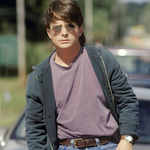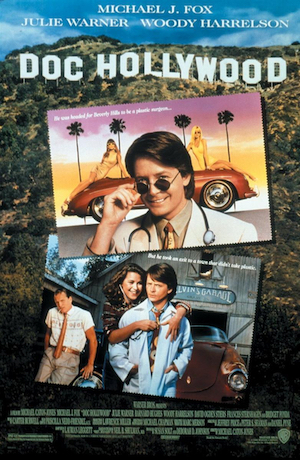 August 2, 1991
August 2, 1991
Don’t get me wrong, I didn’t hate watching DOC HOLLYWOOD 30 years later. But jesus christ, this type of movie. Michael J. Fox (CLASS OF 1984) stars as Dr. Benjamin Stone, an arrogant Washington D.C. emergency room doctor who gives it all up to become a plastic surgeon on the other coast. “Okay, question: Beverly Hills, beautiful women and plastic surgery – what do these three things have in common? Me, in less than a week,” he says to another doctor, clearly convinced this is a fuckin cool thing to say. And then he puts on his LEON-style round glasses, gets a bunch of gum and toothpicks to chew on, and hops in his red ’56 Porsche Speedster to head for the 90210.
 But on his cross country drive (during which he laughs at how fucking awesome he is when he drives on a shoulder to pass a bunch of traffic) he crashes literally into a white picket fence and is forced to to do community service at a small country hospital in “the Squash capital of the south” on “the buckle of the Bible Belt.” Seems like a pain in the ass at first, but then he Learns a Valuable Life Lesson and/or Discovers What He Really Wants Out of Life. (This story was later remade as Pixar’s CARS and Vanilla Ice’s COOL AS ICE.)
But on his cross country drive (during which he laughs at how fucking awesome he is when he drives on a shoulder to pass a bunch of traffic) he crashes literally into a white picket fence and is forced to to do community service at a small country hospital in “the Squash capital of the south” on “the buckle of the Bible Belt.” Seems like a pain in the ass at first, but then he Learns a Valuable Life Lesson and/or Discovers What He Really Wants Out of Life. (This story was later remade as Pixar’s CARS and Vanilla Ice’s COOL AS ICE.)
The nurse at the front desk (Eyde Byrde, the grandma from RAPPIN’) gives Ben the unfriendly welcome he deserves, but the mayor (David Ogden Stiers, same year as BEAUTY AND THE BEAST), the city council and the local knitting circle treat him like a rock star, assume he will love the town and attempt to hire him as the eventual replacement for aging Dr. Hogue (Barnard Hughes, TRON). You can pretty much guess every detail of the town, like that everyone knows each other and eats at the same homey little diner and there’s a gruff waitress (Frances Sternhagen, same year as The Golden Years) who talks mean to him then gives him breakfast on the house.
And he sees a naked lady who turns out to be the ambulance driver, Lou (Julie Warner, “Joe’s Woman,” FLATLINERS) and he falls in love with her and follows the standard romantic comedy arc.
 It’s a tiny town, but there are enough wacky comical medical problems for hijinks-filled montages of him on the job. There’s a ridiculous scene where he finds a serious heart defect in a child, orders a helicopter to take him to a real hospital for emergency surgery, and calls the unfriendly Dr. Hogue, who asks him if he tried giving the kid a can of Coke. Ben rattles off a bunch of medical jargon, lectures the doctor for endangering his patient and tells him to “Get your fat ass out of bed and do your job!” You get a real “all right, this is a real medical professional here, you dumb hicks” type of feel, but it’s a misdirect – the doctor convinces Ben that it’s actually just diarrhea. He knows the families well and figures out what’s going on.
It’s a tiny town, but there are enough wacky comical medical problems for hijinks-filled montages of him on the job. There’s a ridiculous scene where he finds a serious heart defect in a child, orders a helicopter to take him to a real hospital for emergency surgery, and calls the unfriendly Dr. Hogue, who asks him if he tried giving the kid a can of Coke. Ben rattles off a bunch of medical jargon, lectures the doctor for endangering his patient and tells him to “Get your fat ass out of bed and do your job!” You get a real “all right, this is a real medical professional here, you dumb hicks” type of feel, but it’s a misdirect – the doctor convinces Ben that it’s actually just diarrhea. He knows the families well and figures out what’s going on.
The movie is based on a 1979 humor book called What? Dead… Again? by Neil B. Shulman M.D. According to reviews on Goodreads the book is pretty different and doesn’t have much of the romance. I wonder if it has this same belief that fancypants doctors need to shut the fuck about about their stupid fuckin books and experience because if they lived in a small town where they knew all their patients well they could just use little tricks and gimmicks instead of medicine.
One patient, for reasons I didn’t understand, gives Ben his pig. When Lou, who is a vegetarian, mentions something about him saving the pig, he runs across town in a breathless panic to the butcher shop he actually sold the pig to. Just your average professional adult who believes it makes sense to try to impress a lady by taking on pig ownership while staying in a borrowed cabin for a few days.
I should disclose that there are many times during the movie when there’s a wide gap between how cute and charming you’re supposed to think Ben is and what a dipshit I find him to be. This is a problem for me with many comedies from the ‘80s and early ‘90s. I really love some movies like BAD SANTA or YOUNG ADULT where you think “holy shit, what an asshole,” but I’m more turned off by the ones where you’re supposed to think “this guy is awesome check out those sunglasses he really stuck it to that guy with that funny thing he said.” And this is a sanded down version where I’m not even sure how much the filmatists realize he’s an asshole, they just figure if it’s Michael J. Fox the audience will assume he has redeeming qualities whether or not they’re present in the movie.
Tom Lacy (THE GANG THAT COULDN’T SHOOT STRAIGHT) and Mel Winkler (ACROSS 110TH STREET) play the friendly mechanics trying to fix Ben’s car, who for some reason still wear their coveralls and only talk about the job even when he runs into them in town at night. Woody Harrelson (WILDCATS) plays Lou’s sort-of-ex-boyfriend, who proves Ben might have a chance since Lou seems to date asshats. Bridget Fonda (FRANKENSTEIN UNBOUND) has a small role as a local who hates living in this shithole and aggressively hits on Ben in hopes of leaving town with him. She actually gets (for me) the biggest laugh in the movie when he’s leaving and she says her goodbyes and seems to understand that it didn’t work out until she suddenly grabs him and sticks her tongue in his mouth. She’s the MVP.
I saw this movie at the time and I’m sure I thought it was fine. But now I kinda think the message is condescending and phony. There are obviously advantages to both small town living and city living (or any type of living), and those advantages may be more or less important to each individual depending on their personality and circumstances. But in movies and TV (and especially TV movies) it’s a scientific fact that The Big City and Your Big Time Job have taken away your soul, and you just don’t know it until you get stranded for a week in Bumfuck Falls, staying in a cottage equidistant between the General Store (where Old Man Whatsisdick knows everybody’s business) and the town square (where they have the carnival every year). Only then do you realize what’s best in life.
The way DOC HOLLYWOOD brings that old timey sentiment into the ‘90s makes it seem like one of the templates for the later North American artform known as The Hallmark Movie. In a Hallmark movie you wouldn’t usually have a male doctor as the lead, more likely it’s a female magazine writer, and she would’ve grown up in this town and she’d be trying to save a small bookstore or lodge from real estate developers. And there would obviously be no nudity or sexual references. But just like Ben in DOC HOLLYWOOD she’d butt heads with a handsome co-worker or acquaintance and be surprised he has an adorable kid (it is hilarious how bad Ben is at hiding his initial shock and disappointment about that), and she’d be smothered with hospitality from the mayor and given home cooking from the local old ladies, and she’d truly hit it off with the handsome guy during a romantic night at The Annual Festival, and then both would badly hide their disappointment when they suddenly realize she has to leave sooner than expected, and they would consider one of them staying or going so they could be together, but there would be a tearful speech about why it can’t work and a sad farewell followed by brief, hollow return to city life and sudden GASP!-what-are-you-doing-here?-I-decided-to-come-back happy reunion. The end.
To be fair, DOC HOLLYWOOD is definitely much more cinematic than a Hallmark movie. In fact the director of photography is Michael Chapman, who did THE LAST DETAIL, TAXI DRIVER, HARDCORE and Michael Jackson’s Bad, so it looks good. And there are lots of outdoor locations and the music is by Carter Burwell (who also had BARTON FINK that summer) and it even has opening titles by Elaine & Saul Bass. Also, as much as I like Jill Wagner I think it would be fair to argue that there’s a higher level of acting here than on the Hallmark Channel. Or at least Fox and Warner are very effective in the aforementioned scene where their date is made awkward by the judge (motherfuckin Roberts Blossom from DERANGED!) telling Ben he’s free to leave town.
In a way all that makes DOC HOLLYWOOD’s sins more egregious. The fun of Hallmark movies is the pre-fabricated feel. You watch them, at best, like Romy and Michele watch PRETTY WOMAN – making fun of them before unwittingly becoming involved because Alicia Witt is in it or something. You try to predict which variations on the formula will occur (whether or not you are comforted by their familiarity) and you laugh at the basic-bitch sweaters-and-giant-uncluttered-houses lifestyle they’re trying to feed to us as aspirational. Then they end and there’s like 10 seconds of credits and the next one starts, so nobody’s pretending it’s not a mass-produced product.
To me a bonafide movie feels more like it’s talking to me directly, so I feel more insulted by DOC HOLLYWOOD’s assumption that I’m gonna accept this city mouse goes country shit as legitimate wisdom. Do they believe it themselves? My guess is no. If they really loved country living would they be depicting these people as such cartoon hayseeds, falling over a guy because he’s a doctor, carving him a corn cob pipe and naming their baby “Benjamina” after him, literally like 25-30 people showing up to participate in an emotional goodbye when he leaves after being in town for like a week?
The depiction of the Beverly Hills plastic surgery clinic does go full-on satirical: Ben’s new boss is George Hamilton with a ponytail; he fondles one of the limbless, headless female nude sculptures on his office wall; there are five nude models voguing behind fogged glass in the lobby like it’s The Standard hotel. This is indeed the dream work place for the shitty Dr. Ben we met at the beginning, whose soon-to-be-former-co-workers bought him an ass-shaped “Goodbye, asshole” cake and barely tried to hide their disappointment in him abandoning “real medicine” for “Beverly Hills, beautiful women and plastic surgery.”
Yes, to hell with these creeps in Hollyweird who see women as a collection of body parts to ogle. On a completely unrelated topic, did I mention that Lou is introduced skinnydipping? I guess the FRIDAY THE 13TH movies were right about what goes on in these towns. Before Ben knows Lou exists he has a horny dream about her emerging butt naked from the lake (a dream he has because of a magic blanket, and I am not making that up!) and the next morning it actually happens and she struts in front of him because “if you’re a doctor I don’t have anything you haven’t seen before.”
Then of course he runs into her when he starts working at the hospital, and starts doing what the screenwriters have her refer to as “flirting,” and what their Millennial children would know as creepy sexual harassment. “If you tell me you’re here for a physical, you’re gonna make my day,” he says.
(There are so many levels this is weird on. Primarily of course the idea that a doctor would say he would be turned on by giving a physical, but also the fact that he only knows her from being naked in a non-medical setting, at which time she even made a comment based on the premise that doctors would not be turned on by looking at patients naked.)
And then of course we get the ol’ “Tell me where I can find a guy named Lou, drives an ambulance?” “I’m Lou.” Wha-wha-WHUH!!!!!???? spit take, fart, faint, etc.
Ben is supposed to be a nice boy who has slid into a superficial place, but I’m pretty sure we’re supposed to be at least a little charmed by the ol’ rascal getting a boner from giving physicals and doing boob jobs. And there’s a major turning point in the movie where the subtext is pretty insulting. He’s decided he’s outta here and is driving out of town, and to his frustration is waved down by a local whose wife is in the car going into labor. So Ben reluctantly stops to help, leaving his car parked in the middle of the road with the husband in front of it to wave down the next vehicle that passes… but it’s a trucker who has been on the road all night and is starting to doze off.
The way the doctor looks over there it’s clear we’re supposed to take this as the passing of a test, the moment when he finally chooses the beauty of Real Medicine over the gum-chewing-round-sunglasses-wearing-creepy-surgery-fetish lifestyle represented by his Porsche. As if anybody in the world, even this little fucker, would say “Forget it lady, I don’t give a shit about your stupid baby that’s about to pop out, I gotta go throw myself in front of a runaway truck to somehow magically save my car.” What a brave, special man he is, that he chose not to do that.
And he still does go try to do the cosmetic surgery job, but then he finds himself watching TV on his awesome rooftop overlooking the city and nostalgically fondling his 58th Annual Squash Festival hat. And no good man can resist the siren song of the Annual Squash Festival.
The script is credited to Jeffrey Price & Peter S. Seaman (WHO FRAMED ROGER RABBIT) and Daniel Pyne (THE HARD WAY). Laurian Leggett (GETTING PHYSICAL) has a credit for “adaptation.” The director is Michael Caton-Jones, the Scotsman who had done SCANDAL, MEMPHIS BELLE, and this video with Dusty Springfield singing the Wikipedia plot summary of SCANDAL:
On its opening weekend, DOC HOLLYWOOD couldn’t beat HOT SHOTS! or T2 (in its fifth week). But it was profitable and well-reviewed. Harrelson and Fonda soon graduated to headlining movies with WHITE MEN CAN’T JUMP and SINGLE WHITE FEMALE, respectively. Warner was in TOMMY BOY. Price & Seaman later wrote WILD WILD WEST, HOW THE GRINCH STOLE CHRISTMAS, LAST HOLIDAY and SHREK THE THIRD, but they’ll always have Roger Rabbit. Pyne later had credits on ANY GIVEN SUNDAY, THE SUM OF ALL FEARS, THE MANCHURIAN CANDIDATE and Bosch.
Caton-Jones’ subsequent films include THIS BOY’S LIFE, ROB ROY, THE JACKAL, CITY BY THE SEA, and most of all BASIC INSTINCT 2. He also did that Ron Perlman action movie ASHER that I sometimes wonder if I should watch.
Unlike CITY SLICKERS – Summer of ’91’s other big treatise on city people filling the emptiness of their lives by being around livestock briefly – DOC HOLLYWOOD did not get a sequel. But if you want to know what happened to the characters I recommend just watching CARS 2 and 3 and picturing them as humans.
Cultural references: For not the first time in the summer a guy compares a situation to The Twilight Zone. There’s an ADR in-joke where Fonda’s character in L.A. asks “Is that a star?” and Woody Harrelson says, “No, that’s Ted Danson.”


























August 4th, 2021 at 2:05 pm
I was 13 going on 14 when this came out, and I was a big fan of Michael J. Fox, NORTHERN EXPOSURE, and tits, so obviously I enjoyed MICHAEL J. FOX’S NORTHERN EXPOSURE WITH TITS. Not sure how I’d feel about it now but back then it hit the spot.